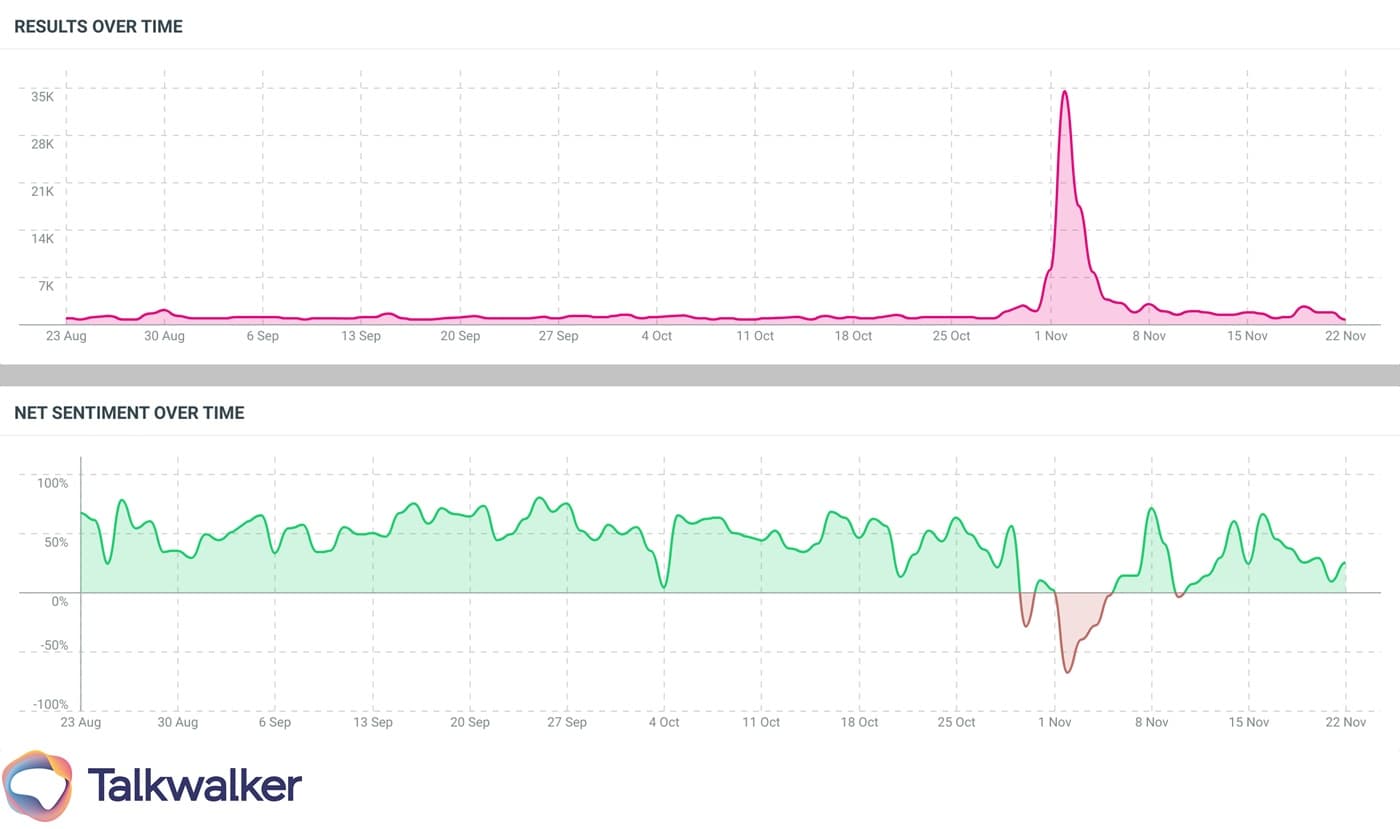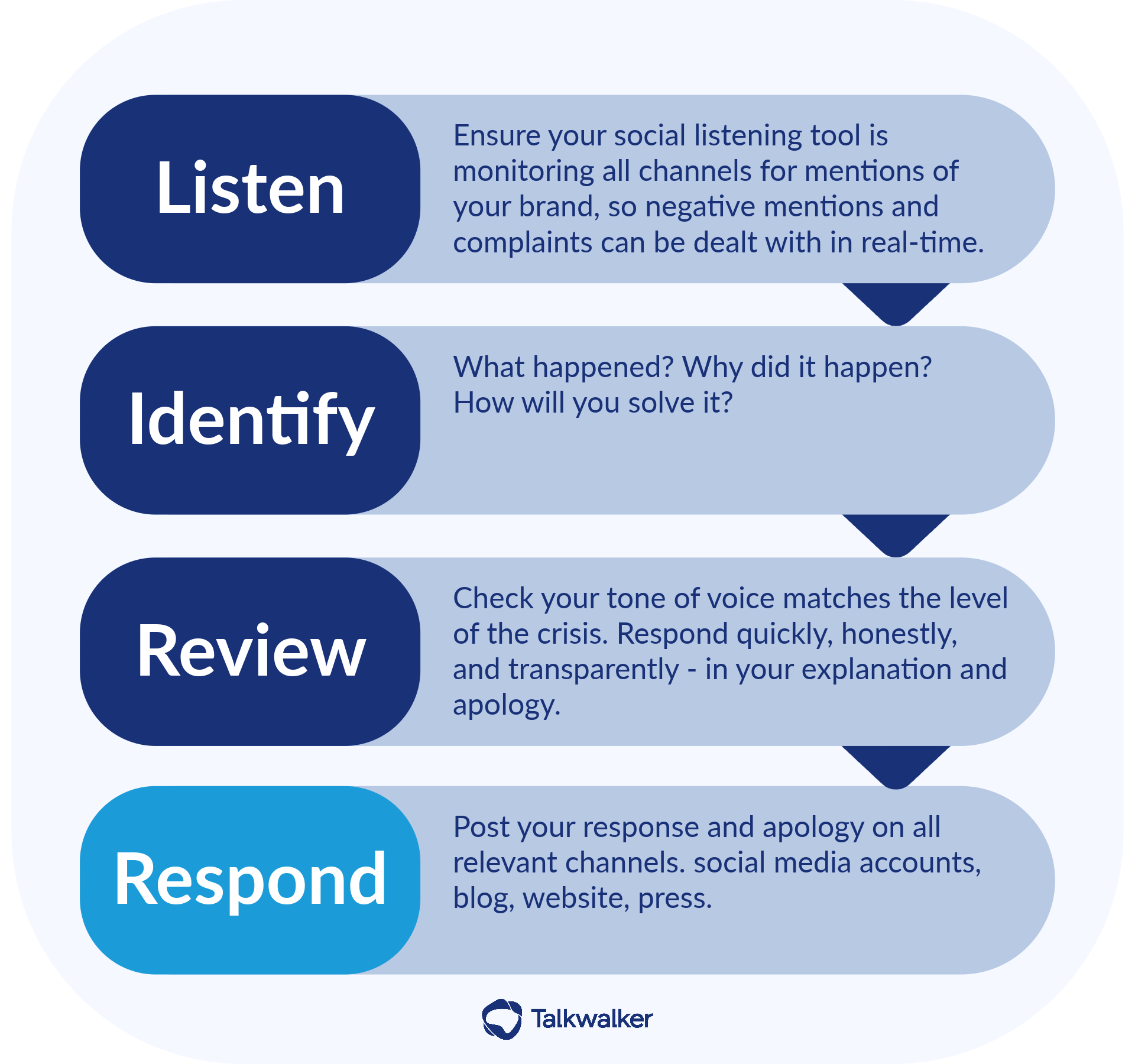What is Crisis Management?
Find out exactly what is crisis management, discover why it's important, and learn about its key components.
February 2, 2024

The ability to effectively navigate unexpected crises has become increasingly important. Whether a social media crisis, a data breach, or a sudden PR disaster, unforeseen events can have significant consequences.
An understanding of crisis management fundamentals is good business practice. It enables you to prepare for, handle, and recover from events that can potentially have a negative impact.
Defining Crisis Management
Crisis management involves preparing for, handling, and recovering from negative events that may disrupt your business operations.
It requires following a series of key steps, starting with the identification and assessment of potential risks. By thoroughly understanding these risks, organizations can create robust plans that ensure swift and effective responses during crisis situations.
By implementing proactive measures such as simulation exercises and training programs you can significantly enhance preparedness levels.
During a crisis, effective coordination and communication among your stakeholders is important. It is essential to establish clear lines of communication, activate crisis management teams, and mobilize necessary resources.
With the right strategies and a vigilant approach, you can effectively manage crises and preserve your long-term success.

When monitoring your brand, a large spike in mentions and drop in sentiment would indicate a crisis.
Key Components
At Talkwalker we believe effective crisis management is made up of the following four components:
Risk Assessment: This involves thoroughly analyzing and identifying potential risks and the impact they pose. As well as developing strategies to effectively mitigate or manage them.
Preparation: Prepare for the unexpected. Your plan should outline procedures to follow throughout all stages of the crisis, ensuring that you’re well-prepared to respond. It also includes establishing clear roles and responsibilities for key personnel. As well as conducting regular training and drills, and keeping necessary resources and communication channels readily available.
Response: The response component is all about effectively managing a crisis as it unfolds. You should create a centralized command structure to ensure clear and timely communication. And implement appropriate measures to reduce the crisis's consequences.
Recovery: After a crisis, the recovery phase focuses on restoring normal operations and learning from the incident. It involves evaluating your response, identifying areas for improvement, and implementing necessary changes to minimize risk of recurrence.
Why Crisis Management Matters
Effective crisis management is crucial for safeguarding your reputation, assets, and stakeholders. Inadequate crisis management can lead to substantial financial losses, a tarnished brand image, and loss of public trust.
When a crisis strikes, a fast and appropriate response can affect the long-term success or failure of your organization. With a robust crisis management plan in place, you can:
Minimize the impact of unforeseen events,
Maintain stakeholder confidence,
Ensure the continued growth and sustainability of your business.
Crisis Management Strategies
To navigate crises successfully, it is crucial to implement robust strategies for crisis management. These strategies encompass key elements that contribute to a comprehensive and proactive approach:
Communication Plans: Develop clear and concise messaging that addresses the concerns and interests of stakeholders. Use consistent and transparent channels of communication to keep stakeholders informed about the status and resolution of a crisis. Leverage both traditional and digital platforms to ensure timely and widespread sharing of information.
Crisis Teams: Assemble cross-functional teams with diverse expertise. These teams should be well-versed in crisis management protocols. With the ability to make swift and informed decisions under pressure. Their responsibilities include coordinating response efforts, liaising with relevant stakeholders, and implementing action plans to mitigate the impact of the crisis.
Crisis Simulations: Regularly conduct comprehensive crisis simulations to assess your business readiness for various crisis scenarios. These simulations provide valuable opportunities to identify strengths, weaknesses, and areas for improvement in your crisis management capabilities. By simulating realistic crisis situations, organizations can refine their response strategies, enhance coordination among team members, and identify potential gaps in resources or processes.
Social listening: Use social listening to help in the early detection of crises, and to monitor ongoing situations. This will help you target consumers that are most affected and adapt your messaging to effectively respond to their complaints. Next generation social listening can help supplement your team through generative AI. This can make it easier to monitor large volumes of data, with AI-summaries and automatic data insights.
By adopting these strategies, you can respond quickly to unforeseen events while maintaining public trust. Embracing proactive crisis management measures is crucial for the long-term success, resilience, and reputation of any organization.
You can learn more about the

Crisis Management Stages
The crucial steps involved in effective crisis management include:
Identification: Swiftly recognizing the crisis and thoroughly assessing its potential impact on your business and its stakeholders. For example, implementing a robust monitoring system can help identify early warning signs and potential crises before they escalate. Helping you to respond faster.
Assessment: Evaluating to determine the severity of the crisis, by analyzing potential risks, and creating a plan of action. This ensures the most appropriate response to mitigate the crisis. During the assessment phase, it is crucial to gather real-time information from various sources. You should include internal teams, external experts, and relevant stakeholders, to make informed decisions.
Communication: Proactively and transparently inform stakeholders about the crisis, addressing concerns, and providing consistent updates. This fosters trust, reassurance, and confidence in your ability to manage the crisis effectively. Effective crisis communication involves social media, press releases, and direct engagement with stakeholders.
Resolution: Implementing well-designed strategies to effectively manage the impact of the crisis, prioritize the safety and security of stakeholders, and minimize disruptions. This ensures a swift and successful resolution to the crisis. For instance, establishing clear roles and responsibilities, coordinating cross-functional teams, and leveraging technology can streamline crisis response efforts and facilitate efficient resolution.
Recovery: Swiftly restoring normal operations and leveraging the lessons learned from the crisis to enhance future crisis management efforts. This involves developing a comprehensive recovery plan that addresses the immediate aftermath and long-term implications. You should also use the post-crisis as an opportunity to make improvements in processes, systems, and training.
To discover how Talkwalker can help you during a crisis, just click below.
{{cta('85064928721')}}
